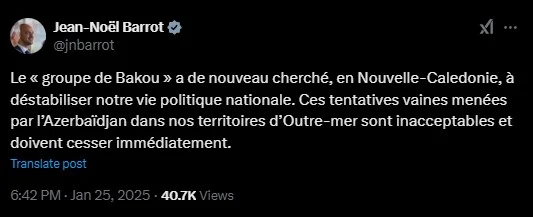The French double standard: between championing national sovereignty in New Caledonia and denying Algeria the right to uphold its own in the Boualem Sansal case
The recent controversy surrounding the statements of Abbas Abbasov, Executive Director of the Baku Initiative Group, during the International Decolonization Front Congress in Nouméa, New Caledonia-Kanaky, has once again exposed a recurring paradox in French diplomacy. While France reacts decisively when its own sovereign interests are at stake, it adopts a contrasting stance when criticizing similar actions by other states, as seen in the case of Algerian writer Boualem Sansal. This double standard, which raises questions about consistency and principle, deserves closer scrutiny.
An Unyielding Attachment to National Sovereignty
At the Nouméa Congress, Abbasov expressed support for the Kanak people's right to self-determination—a claim rooted in international law, which upholds the right of peoples to determine their political status. Yet, for France, this was seen as a direct challenge to its territorial integrity. French Foreign Minister Jean-Noël Barrot promptly condemned Abbasov’s remarks as a "destabilization attempt against French national political life."
For France, New Caledonia represents more than a distant overseas territory. It is a strategic linchpin in the Indo-Pacific, a region of growing economic and geopolitical importance. Despite multiple referendums on independence, including the last one boycotted by Kanak independence advocates, Paris remains resolute in maintaining its influence over this resource-rich archipelago. International critiques of its stance are therefore viewed as unwelcome interference in its domestic affairs.
Defending Freedoms in Algeria: A Selective Posture
In contrast, France has openly criticized Algeria for its treatment of writer Boualem Sansal, accused under Article 87 bis of the Algerian Penal Code of threatening national territorial integrity. Paris has denounced the charges as a violation of fundamental rights, portraying Sansal as a courageous voice of dissent against the Algerian government.
In this case, France frames its stance as part of its broader commitment to human rights and freedom of expression. However, this position starkly contrasts with its firm rejection of calls for Kanak self-determination. France’s insistence on defending individual freedoms abroad, while resisting similar principles when applied to its own territories, reveals a glaring contradiction.
A Revealing Double Standard
The contrasting cases of New Caledonia and Boualem Sansal are not isolated incidents; they epitomize a broader pattern of French diplomacy that relies on a dual approach to sovereignty and universal rights:
- Defending national sovereignty when it concerns France: France adamantly safeguards its territorial integrity and reacts forcefully to any perceived challenges, even when rooted in international law.
- Criticizing violations of rights in other states: Simultaneously, Paris condemns other governments for similar actions, invoking principles of human rights and freedom of expression.
This double standard underscores an instrumental use of universal principles: they are leveraged when they align with French interests but sidelined when they threaten its sovereignty.
Diplomatic Consequences
This inconsistency exposes France to growing international criticism. By aggressively defending its own interests while championing universal values, it risks losing credibility among nations that denounce its “two-tiered” approach.
- In New Caledonia, France’s reactions to international support for Kanak independence risk deepening anti-French sentiments in its overseas territories.
- In Algeria, its defense of Sansal could be perceived as neo-colonial interference, exacerbating the historically fraught relationship between Paris and Algiers.
Toward a Coherent Diplomacy?
If France wishes to maintain its status as a respected global power, it must adopt a more consistent approach. Defending national sovereignty is legitimate, but it should not come at the expense of principles it claims to uphold on the international stage. Similarly, championing universal rights requires applying them impartially, including within its own territories.
This issue is more than a diplomatic spat; it raises questions about France’s ability to align its actions with its rhetoric. The double standard undermines its legitimacy and fuels skepticism about its true intentions. A reformed diplomatic posture—grounded in a genuine balance between sovereignty and universal rights—could be key to restoring credibility on the global stage.
Conclusion
The Abbasov-Sansal controversy highlights a fundamental contradiction in French foreign policy. As long as France continues to apply double standards, it will remain vulnerable to criticism that could ultimately erode its influence and reputation worldwide. The challenge for France lies in finding a way to reconcile its national interests with the universal principles it claims to champion. Only through such coherence can it truly embody the values it professes to defend.



Comments
Post a Comment